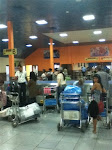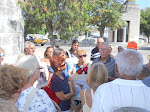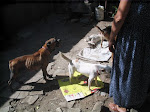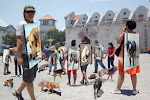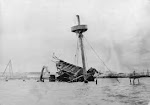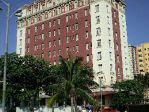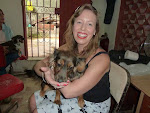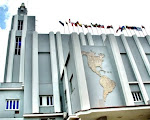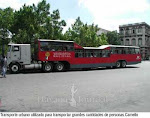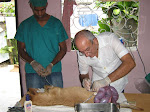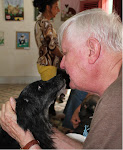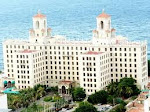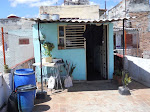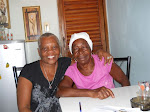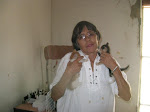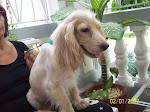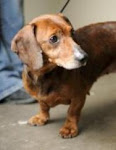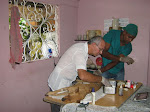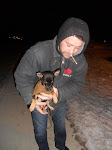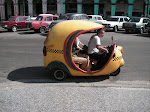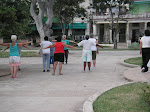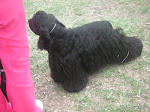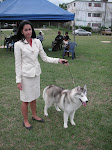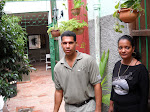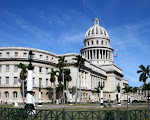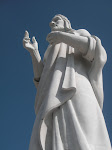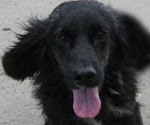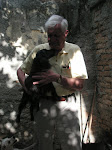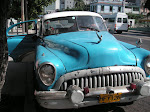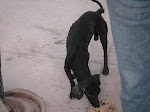An Encounter with Big Brother
My friend Ray and his friend Chuck decided they wanted to travel to Cuba, and Ray called me one day to learn how I had managed to go there 8 times. Ray is a successful businessman who has traveled all over the world, so I could understand his wanting to go to a place most of us think is completely forbidden by US law. Remembering Ray was a supporter of TAP, I told him they could probably qualify for the humanitarian exception to the US travel restrictions. His interest in our work in enabling massive spay/neuter campaigns, his willingness to carry some veterinary supplies in his luggage, and his desire to visit Aniplant's headquarters could all be considered in getting a license to travel legally into Cuba.
I started him off with a referral to a friend at Cuba Religious Initiative, an American NGO licensed to permit qualified US travelers to visit Cuba. After that I didn't have much contact with Ray, as he is an experienced world traveler, and I knew he could handle the details of his travel arrangements. I did suggest he stay at Havana's Hotel Nacional, and he told me he had a need to be in Costa Rica, so he would fly from San Jose to Havana for a four day stay. I alerted Nora of his visit so he would be able to visit the Aniplant headquarters and other points of interest.
Several days before he left, instead of vet supplies, I gave Ray a 10 pound pack of TAP brochures which Nora had requested of Charlene during her trip to Havana in April. I had carefully identified the contents and destination of the package. We wished Ray well on his trip.
They bought Cuban Tourist Visas in the San Jose airport and traveled to Havana on a Wednesday arriving at Havana's Terminal 2, a modern facility with all the trimmings like jetways. Their troubles began as they passed through Cuban Immigration. "What is the purpose of your trip to Cuba?" asked the agent. "Religious," said Ray, prompted by his US license from Cuba Religious Initiative. That was really the wrong thing to say. The CRI license is actually not for approving religious travelers. Its name comes from its founder's close connection to Jewish groups in the US and Cuba. I had used the CRI license without incident for a group of 5 travelers earlier this year, and we were all there for humanitarian (spay/neuter, animal protection) purposes.
Ray didn't know Cuban Immigration is particularly sensitive to religious matters. You can visit the country and even call on religious sites and go to church, but they don't want you preaching. They also require a much more expensive religious visa than the tourist visas Ray and Chuck were carrying. That precipitated a 3 1/2 hour long interview in the airport arrival terminal during which Ray and Chuck showed the agents their US license to travel.
Now agents of Havana's Terminal 3 (where all the flights of US origin arrive) are used to seeing such licenses, but they give them little attention as they have nothing to do with Cuban immigration. They aren't in the business of enforcing US travel regulations. Chances are the Terminal 2 agents Ray and Chuck were talking with had never seen a CRI license before, and certainly they rarely saw US citizens at their terminal. Here the agents were with two gringos there for religious purposes (by their own admission) with some sort of curious US paperwork with the word, religious, in its letterhead. From their point of view these guys were very suspicious.
Ray and Chuck were more than a little shaken by their long, contentious interview. At the end of it, they were allowed to go into town and to their hotel, but were instructed to appear at an Immigration office and buy religious visas. Ray called me that evening and I joined them in feeling apprehensive. As a general rule, you don't want to mess around with immigration agents in any country, much less in Cuba. I immediately emailed Nora, and she acted immediately with her friend (and Aniplant Director) Maylin, a competent English translator. They arranged to meet Ray the next day and to call on the Aniplant attorney.
On Thursday, the Aniplant attorney heard the story, felt there was nothing too serious, and advised them to enjoy their brief time in Havana and show up for their return flight to Costa Rica where it would be resolved prior to their departure. The rest of Thursday and all of Friday were therefore devoted to tourist activities. Saturday at the airport, they were told they could not leave and that more steps were needed to resolve the issue. Of course the Immigration office in town was not open on the weekend, so they planned to show up there Monday morning.
They had to return to the hotel, register for two more nights, and kill time for the rest of the weekend. Ray realized the extra costs of the hotel and expenses for the extra time were going to strain their cash resources. Here at home and in most foreign countries that wouldn't be a problem. But in Cuba credit cards on US banks cannot be used. (The originally planned 4 nights had been prepaid, but now the extra expenses of the longer stay were mounting.)
They found time to go the Aniplant's headquarters in Central Havana and see the renovations we had done to the 200 year old building—new utilities, water system, bathroom fixtures, an added second floor, painting and tile work, and a new veterinary clinic. Ray told me how much he had liked Aló Presidente, who I consider sort of my dog. See Aló's story in these blogs dated August 20, 2010 and titled "Aló Presidente." Nora and Maylin took care of Ray and Chuck, never leaving them to sort out problems on their own. They loaned them the money to get home which was needed until they could get back to a place where their credit cards worked again.
They all showed up at their 8:30 am appointment at Immigration thinking a resolution was imminent, but these agents were acting pretty tough. They repeatedly asked, "Did you come to Cuba to work (preach)?" They finally were directed to appear at another Immigration office downtown at 10 am on Tuesday. That meant still another extra night in the hotel as they could not leave on Monday's flight. Worse news: at this Tuesday interview Nora and Maylin would not be allowed to attend. Still worse news: They would travel to that office in an official car (as if they might escape when all they wanted was to go home.).
At 10 am Tuesday they showed up and began still another session of pointed questioning. They had checked out of their seventh night in the hotel and had their luggage ready to go. They were reserved on a 6 pm flight to Costa Rica (3:00 check in) and hoped this meeting would not last long enough to make them miss that flight.
Finally, out of the blue and with no stated reason, one of the agents told them the matter had been resolved. They had determined Ray and Chuck had done nothing wrong. They were free to buy their tickets, go to the airport, and leave.
They had to drive into the western suburbs to change their tickets then drive well out of town to get to the airport. Nora and Maylin were with them and had promised Ray that they wouldn't leave the airport until their plane was off the ground. They arrived at the airport with little time to spare.
Believe it or not, after running this gauntlet of probing agents and of the airport officials questioned them again. Once came the questions, the answers, the uncertainty. Finally a smiling face told them, "OK you can leave; it's clear you did nothing wrong." They barely had time to board the plane.
Nora and Maylin did indeed remain at the airport until they saw the plane lift off from the ground.
Sometimes to be in another world you don't have to be very far from home. Ray and Chuck now have a story from behind the Iron Curtain they can tell their grandchildren, and Nora and Maylin can be proud of their prowess as animal protectors—only this time the animals they protected were human animals.
Les Inglis
Saturday, September 22, 2012
Friday, September 7, 2012
Excess Baggage
Excess Baggage
I read a daily newspaper-like website called Havana Times. It seems to be a place for free speech and offers an opportunity to add comments to each article. Writers seem to come from all political leanings—old line Stalinist Communists, modern Cubans who support the government, disidents, Cuban expatriates who have fled to the US, and these last are further divided between those who hate the Castros and those who just long for a return to normal relations between the US and Cuba.
I try my best to keep politics out of what I write about Cuba. After all, our main interest is to improve life for the animals in Cuba, and politics is mostly a "people" business. Therefore, why should I weigh in on political topics? I'm not disposed to criticize my own country and when I'm in Cuba, I know my presence as a guest will only be tolerated so long as I stay away from political themes. Fine by me.
One article by a Cubana seemed to take offense that US visitors there often bring items along to pass out as gifts—like bars of soap, or tubes of toothpaste or perhaps shampoo. She felt it was somewhat demeaning to accept such gifts, as there are sources for them in Cuba and accepting them would suggest Cubans live a much more basic existence than they actually do. Perhaps they can't get US brands because of the embargo, so this means no Colgate toothpaste. But this doesn't mean no toothpaste at all.
Well, in my visits I've always used hotels and talked mostly about animal matters, so I can say that even after eight trips, I don't have a full appreciation of the daily lives of Cubans—their problems, their pleasures. Surely there is pressure on workers to feed, house, clothe, and transport, but I'm sorry to say that I can't articulate the details of these pressures.
Every trip I've made I've taken lots of meds and vet supplies. This is an area where I know the locals sometimes face severe shortages. Once, the organization that gave me the US license to travel to Cuba asked me to carry a few packages of personal items to specific people in Cuba. A box arrived at my house from them with a few packages of toothpaste, vitamins, soap and such. I'm sure that charity believed that mundane personal items were needed and wanted in Cuba.
Xenia and Bob, good friends who have gone there twice with me carry along prodigious quantities of vet items, but Xenia doesn't forget the personal either. On her first trip she had several beautiful women's handbags. They were for Nora to pass out to the volunteer members of Aniplant. We later heard those handbags were some of the most appreciated items we brought.
Charlene decided to clear out some closets and ended up with 150 pounds of women's dresses, slacks, tops, etc. I went to Salvation Army and got a huge rolling suitcase for them. Nora felt they were all useful and carried them back to Cuba as excess baggage after attending the Humane Society of the US Animal Care Expo in 2009.
While I can only speak for myself and a few close friends who have traveled with me, I can state that every donated item is offered in the hope it fills an unmet need in someone's life. There is so much we have that we probably don't need or perhaps will never use. We try to get some of this stuff across the Florida Straits as an act of love. Never is there the connotation of "alms for the poor." Instead we offer "help for our fellow creatures" (human or otherwise.)"
Les Inglis
I read a daily newspaper-like website called Havana Times. It seems to be a place for free speech and offers an opportunity to add comments to each article. Writers seem to come from all political leanings—old line Stalinist Communists, modern Cubans who support the government, disidents, Cuban expatriates who have fled to the US, and these last are further divided between those who hate the Castros and those who just long for a return to normal relations between the US and Cuba.
I try my best to keep politics out of what I write about Cuba. After all, our main interest is to improve life for the animals in Cuba, and politics is mostly a "people" business. Therefore, why should I weigh in on political topics? I'm not disposed to criticize my own country and when I'm in Cuba, I know my presence as a guest will only be tolerated so long as I stay away from political themes. Fine by me.
One article by a Cubana seemed to take offense that US visitors there often bring items along to pass out as gifts—like bars of soap, or tubes of toothpaste or perhaps shampoo. She felt it was somewhat demeaning to accept such gifts, as there are sources for them in Cuba and accepting them would suggest Cubans live a much more basic existence than they actually do. Perhaps they can't get US brands because of the embargo, so this means no Colgate toothpaste. But this doesn't mean no toothpaste at all.
Well, in my visits I've always used hotels and talked mostly about animal matters, so I can say that even after eight trips, I don't have a full appreciation of the daily lives of Cubans—their problems, their pleasures. Surely there is pressure on workers to feed, house, clothe, and transport, but I'm sorry to say that I can't articulate the details of these pressures.
Every trip I've made I've taken lots of meds and vet supplies. This is an area where I know the locals sometimes face severe shortages. Once, the organization that gave me the US license to travel to Cuba asked me to carry a few packages of personal items to specific people in Cuba. A box arrived at my house from them with a few packages of toothpaste, vitamins, soap and such. I'm sure that charity believed that mundane personal items were needed and wanted in Cuba.
Xenia and Bob, good friends who have gone there twice with me carry along prodigious quantities of vet items, but Xenia doesn't forget the personal either. On her first trip she had several beautiful women's handbags. They were for Nora to pass out to the volunteer members of Aniplant. We later heard those handbags were some of the most appreciated items we brought.
Charlene decided to clear out some closets and ended up with 150 pounds of women's dresses, slacks, tops, etc. I went to Salvation Army and got a huge rolling suitcase for them. Nora felt they were all useful and carried them back to Cuba as excess baggage after attending the Humane Society of the US Animal Care Expo in 2009.
While I can only speak for myself and a few close friends who have traveled with me, I can state that every donated item is offered in the hope it fills an unmet need in someone's life. There is so much we have that we probably don't need or perhaps will never use. We try to get some of this stuff across the Florida Straits as an act of love. Never is there the connotation of "alms for the poor." Instead we offer "help for our fellow creatures" (human or otherwise.)"
Les Inglis
Subscribe to:
Posts (Atom)
